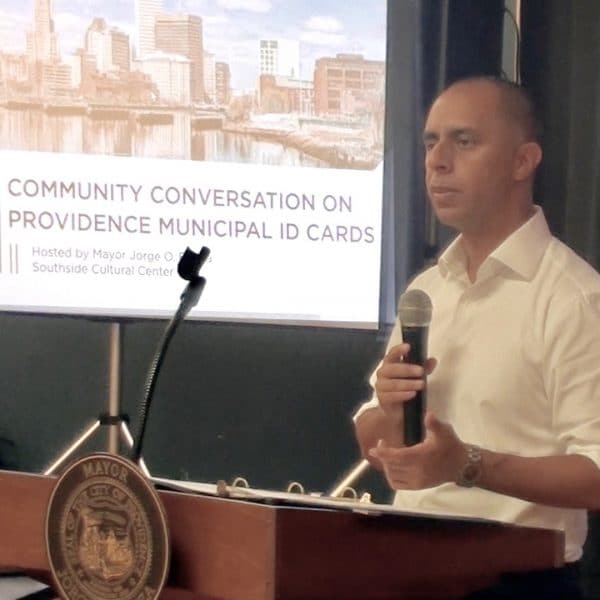Providence begins discussion of Municipal IDs
“Simply put, Municipal ID cards affirm your residency in out city, regardless of immigration status, regardless of housing status or criminal history,” said Providence Mayor Jorge Elorza at a Community Conversation on Providence Municipal ID Cards Tuesday evening. Elorza was speaking to a packed room in the Southside Cultural Center on Broad Street. The meeting was co-sponsored by an array
August 10, 2017, 6:03 pm
By Steve Ahlquist
“Simply put, Municipal ID cards affirm your residency in out city, regardless of immigration status, regardless of housing status or criminal history,” said Providence Mayor Jorge Elorza at a Community Conversation on Providence Municipal ID Cards Tuesday evening.
Elorza was speaking to a packed room in the Southside Cultural Center on Broad Street. The meeting was co-sponsored by an array of groups such as Crossroads Rhode Island, Dorcas International Institute of Rhode Island, Higher Ground International, Institute for the Study and Practice of Nonviolence, Muslim-American Advisory Board, NAACP Providence Branch, New Bridges for Haitian Success, OpenDoors, Providence Human Relations Commission, Refugee Dream Center, A Sweet Creation, TGI Network, Year Up and Youth Pride Inc, concerned about marginalization under Donald Trump‘s presidency. These groups represent documented and undocumented immigrants and refugees, the transgender community, Muslims, youth and the homeless.

Theresa Agonia
Elorza’s deputy chief of staff Theresa Agonia ran the meeting and is heading up this new initiative. Agonia explained, (third video below) that the municipal ID card typically features the photo of the cardholder, along with other basic identifying information such as address and date of birth. The cards are “typically accepted as proof of identity by all local government agencies and officials, including the police.” The cards may provide the cardholder with benefits at businesses, museums and entertainment venues. The cards might also provide “access to financial services” as a pre-loaded debit card.
Over the course of the one hour meeting, which was mostly done in a question and answer format, residents rose and made suggestions or asked questions. There was a concern expressed about the retention of information by the city (or private vendor) and the possibility that the collected information might be accessed by the Federal government putting undocumented immigrants at risk. This concern was shared by the Mayor and Agonia, who are looking into best practices as to how long to keep such records and at quickly destroying copies of the documentation used to approve the issuance of IDs. It was also noted that there are court cases that have affirmed the confidentiality of such information. I noticed that Steven Brown, executive director of the ACLU of Rhode Island was in the audience and listening attentively.
 The promise of a Municipal ID, as a library card, as a way of accessing public transportation, as a way to receive discounts, should be enough of a draw to get people who are secure in their housing and resident status to get the cards for the perks. This will make the list of cardholders useless for determining immigration status, since a wide range of Providence residents should be interested in a Municipal ID.
The promise of a Municipal ID, as a library card, as a way of accessing public transportation, as a way to receive discounts, should be enough of a draw to get people who are secure in their housing and resident status to get the cards for the perks. This will make the list of cardholders useless for determining immigration status, since a wide range of Providence residents should be interested in a Municipal ID.
For the LGBTQ community, the ID cards will allow the cardholder to choose the sex they want to be identified as. At least three options, male, female and neither, will be made available. This allows a transgender resident the ability to have identification more in keeping with the way they identify.
Rodrigo Pimental (fourth video below) is an undocumented immigrant who came to the United States at the age of ten months. Access to a library card was not possible when Pimental was growing up. Even getting picked up by the parents at school was made difficult, since the parents lacked identification. The Trump administration, said Pimental, is “driving immigrants further and further into the shadows and this municipal ID will allow immigrants to actually participate, have access to financial institutions and they will be less fearful of interacting with police officers.”
Full video of the meeting is below. This was the first of a series of conversations around Municipal IDs. RI Future will be covering this topic closely over the next few months.
Providence City Councilor Mary Kay Harris (Ward 11) briefly addressed the crowd.
Explanation
Rodrigo Pimental
Lucas Hawthorne is a leader and facilitator at Youth Pride Inc. They explained the importance of having an ID that matches the gender identity of the cardholder.
“Everybody in the City of Providence should feel that they have access to their police department when need be,” said Providence Police Captain Dean Isabella.
Agonia explains best practices for municipal IDs:
Here are all 23 questions and answers from the attendees.






